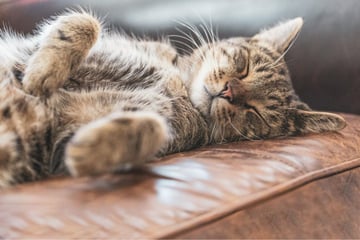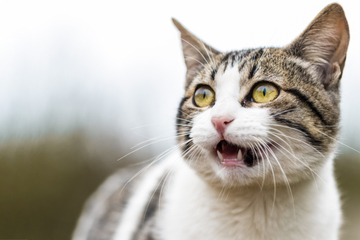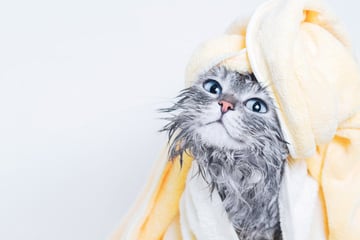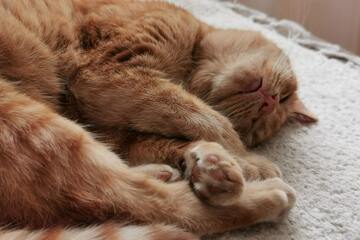How heavy should my cat be? How to help a cat lose weight
Keeping your feline friend both healthy and happy is an important part of cat ownership. At what point is your cat getting a little too heavy, and what can you do about it?
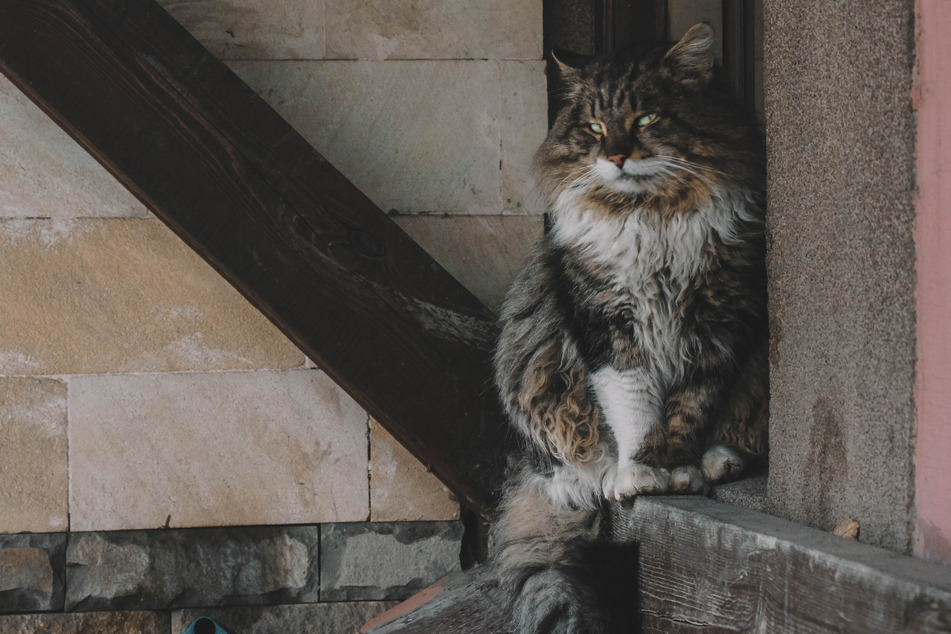
Let's be real: cat's have little to no self-control.
If you present your pet with a tasty bowl of snacks, the whole thing will be gone in the blink of an eye.
It comes down to us, as cat owners, to monitor our furry friend's weight, diet, and health, but that may be easier said than done.
In this cat guide, TAG24 will take you through how much a cat is supposed to weigh, using the cat weight chart. We'll also dive into how you can help your cat lose weight!
What is a healthy cat weight?
You can't tell an overweight cat just by a sagging belly, as a primordial pouch is actually quite normal. You should also check for a hard-to-find spine and a lack of touchable shoulder-bones, or consult the cat weight chart we're about to reveal.
A cat's weight typically shouldn't reach above 10 pounds, but it also depends on the breed. UK Veterinarians Sarah Colegrave and Natasha Demir claim that larger cat breeds can reach 25 pounds while smaller breeds can have a healthy weight of only five pounds.
Important: As a result of these discrepancies, it is best to take your cat to the veterinarian if you are concerned that it has put on a bit of weight. They will be able to determine its health.
The cat weight chart
Your best bet if you want to keep on top of your cat's weight is to abide by the Purina Cat Body Condition System, available as an easy-to-understand chart. This tool ranks your cat's likelihood of being overweight based on its visible body fat and physiology.
This chart basically says that if your cat has visible ribs and looks like it has a waist, it is likely to be underweight. On the flip side, if you can no longer feel your cat's ribs when you pat it, or if it is becoming round and increasingly saggy, then it is likely overweight. If you witness these symptoms, it's time for a trip to the veterinarian.
Why is it important to keep your cat at a healthy weight?
You need to keep your cat in tip-top shape, and at a reasonable weight, because there are a variety of potentially-dangerous health concerns that come with feline obesity. These health concerns range from manageable disorders like diabetes to a higher risk of other illnesses and conditions that may result in death.
Here are just a few of those obesity-related cat health concerns:
- Arthritis
- Cancers
- Diabetes
- Pancreatitis
- Joint problems associated with excess weight
- Heart disease
- Bladder stones
- Hepatic lipidosis
- Higher likelihood of developing other health conditions
- Treatment difficulties due to the weight
It's important to look after your cat, as it is an instinctual being that will continue to behave as it is designed, no matter the consequences. Many of these health issues can be fatal, and overweight cats often suffer from poor health throughout their lives. That's why it's important to keep them slim.
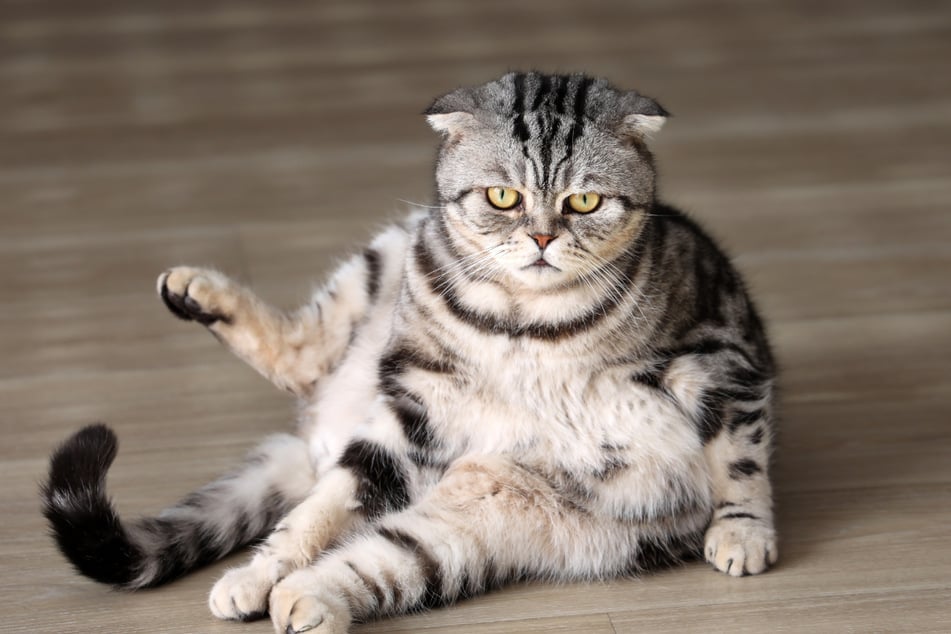
Why do cats get above their ideal healthy weight?
Cat obesity is similar in its causes to its human equivalent. Ultimately, while there are many health reasons that can explain a cat's excessive weight, a feline's road to growth generally comes from an extensive intake of energy which has not been countered by an appropriate release through exercise.
Here are a few possible reasons why your cat is overweight:
- Your cat's diet is unhealthy: Cats should not consume foods that contain large amounts of carbohydrates, fats, and sugars. Instead, their food should primarily consist of lean proteins. It is best to feed them only cat food, and no human food, in portions determined by your veterinarian.
- Your cat doesn't exercise enough: If your cat is an inside cat, a lack of exercise can be a serious problem. Wild felines exercise a lot when they hunt and climb, as do outdoor cats, so it's a good idea to provide opportunities for exercise to your indoor cats, in addition to a highly controlled diet.
- Breed and genetics play a role: Certain cat breeds have specific characteristics, including whether they are large or small. On top of that, genetics can predispose some cats to weight gain or loss. Again, this is something to be looked at by your vet.
- Your cat's age and health status are a factor: A cat that's older will be more likely to gain weight and will have a slower metabolism. Health issues can also cause weight gain, and certain medications can have the same effect.
The most important point to make when discussing the reasons behind your cat's obesity is whether this is something that can be resolved via a change in behavior. Of course, you can't force exercise on a cat, but you can control its diet. Your first question should be: Is this the solution I seek?
How to help a cat lose weight
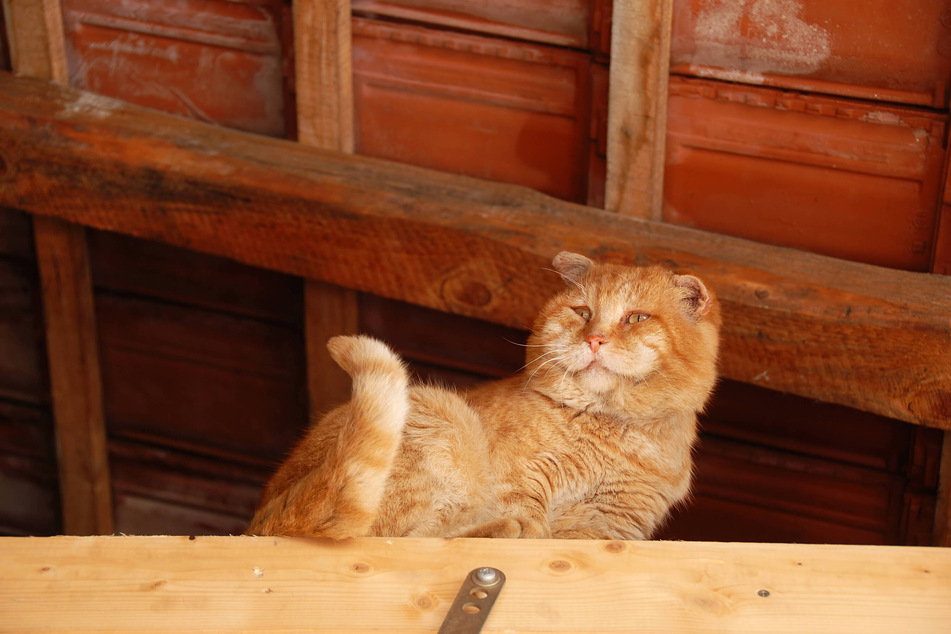
There are a variety of different weight-loss methods available for rotund kitties. If you want your cat to lose weight, the first thing you must do is take it to the veterinarian and have it looked at. Your vet will be able to give you a proactive weight-loss strategy, targeted at your cat in particular.
Here are a few steps to help a cat lose weight:
- Change its diet: Certain foods are very bad for your cat, so there are a few things that need to be done. If you are feeding it human food, this needs to stop immediately. Choose cat food that is of a high quality and designed to provide the right nutrients while also low in fat. In the case that your veterinarian sees a real issue, weight-loss cat food may need to be used.
- Shift when your cat eats: Timing is also important when it comes to food intake, as is schedule and developing healthy habits. It's a good idea to always feed your cat at exactly the same time. Preferably, you should feed your feline at human meal times, and not provide continuously available treats and biscuits.
- Adapt your cat's food portions: If you are feeding your cat an entire can of cat food, and a bowl of biscuits every day, it may be too much. Reduce the amount of food you give your kitty overall, after consulting your veterinarian of course.
- Increase your cat's exercise where you can: Your cat's exercise levels are incredibly important, even if it's hard to control them. If your cat doesn't exercise enough, there are a few ways to help.
- Increase the amount of play time you spend with your kitty.
- If your cat likes to swim, increase the regularity of this activity.
- Purchase more chase-able toys, and toys that encourage physical activity and hunting.
- Make sure your cat spends as much time outside as possible.
- Change the location of your cat's food and favorite sleeping spot so that it requires some exercise to get to.
Are cat diets worth it?
You need to be very careful when putting a cat on a diet, but diets do work. Keep in mind that rapid weight loss can lead to serious illnesses like hepatic lipidosis, and no overweight cat should be put on a diet before consultation with a vet.
Remember that the internet, and articles like these, should never replace advice from a medical expert. Cat dieting shouldn't be undertaken lightly. They have a different physiology from humans and different needs. Be careful that you give them the right food and keep them healthy while they lose weight.
Keeping a normal cat weight is important for feline health
Just as overweight humans are at increased risk of health complications, cat obesity is a serious risk factor. It shortens their life expectancy, makes it harder for them to move around, and decreases their level of happiness as a result.
It's important to be a responsible cat owner, limit your kitty's diet, and make sure it remains at a reasonable weight. If your pet strays over that healthy mark, it's time to start a weight loss regimen.
Cover photo: Ignat Kushanrev / Unsplash
